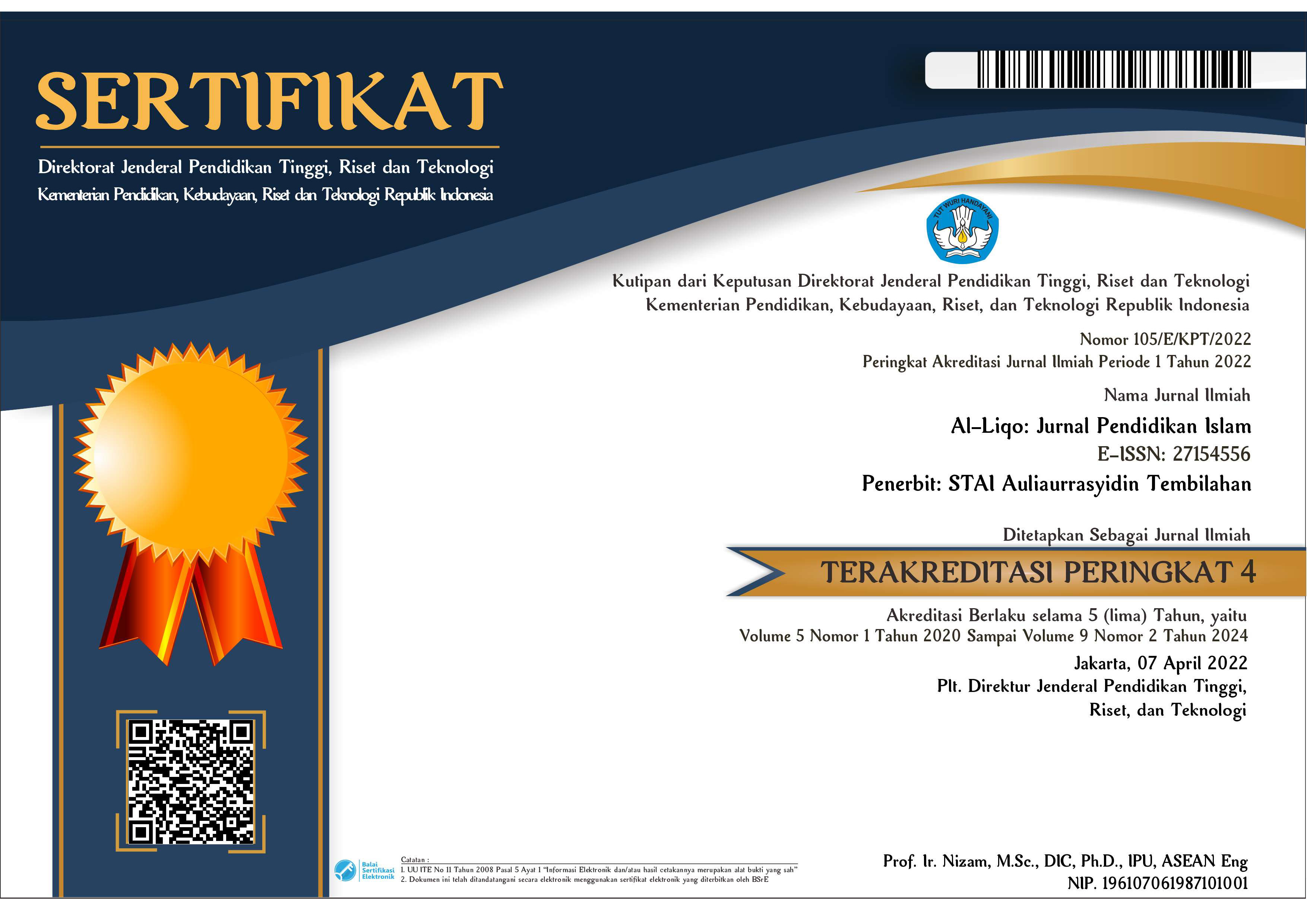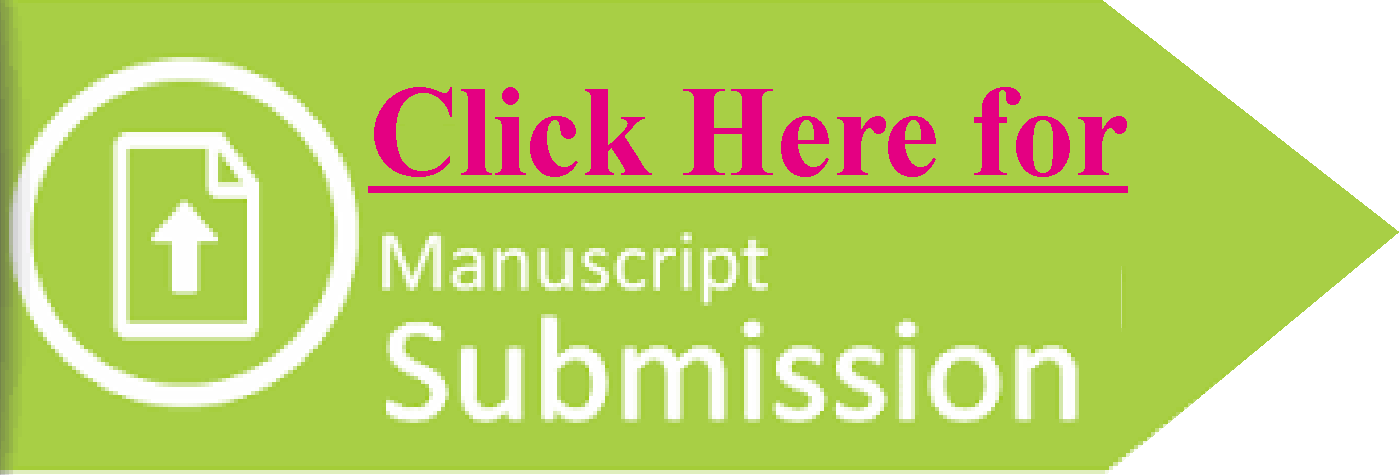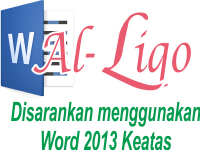Kompetensi Guru PAI dalam Mengimplementasikan Kurikulum Merdeka Belajar di Sekolah Muhammadiyah
DOI:
https://doi.org/10.46963/alliqo.v8i1.793Keywords:
Competence, PAI Teachers, Independent CurriculumAbstract
The independent learning curriculum as a complement to the previous curriculum was considered a solution to overcome learning loss during the pandemic. This is a challenge in itself for the competence of Islamic Religious Education teachers in implementing the independent learning curriculum in Muhammadiyah schools which have a unique curriculum for that organization. This study aims to analyze the competence of PAI teachers in implementing the independent learning curriculum in Muhammadiyah schools and the methods used by teachers in implementing this curriculum. The method used in this research is descriptive qualitative research with a library research approach. As a result, to implement an independent learning curriculum, PAI teachers should have 4 basic teacher competencies, and in implementing this curriculum PAI teachers should carry out 7 stages of independent learning curriculum implementation.
Downloads
References
Akmal Hawi. (2013) Kompetensi Guru Pendidikan Agama Islam.Jakarta: Raja Grafindo Persada
Bafadal, Ibrahim. (2006). Peningkatan Profesionalisme Guru Sekolah Dasar:
Dalam Kerangka Manajemen Peningkatan Mutu Berbasis Sekolah. Jakarta:
Bumi Aksara
Cikaa Hairuddin. (2020). Peranan Kompetensi Guru Pendidikan Agama Islam
(PAI) Dalam Meningkatkan Interaksi Pembelajaran di Sekolah.Guru Tua :
Jurnal Pendidikan dan Pembelajaran, Volume 3 Nomor 1
Daga Tanggu Agustinus. (2021).Makna Merdeka Belajar dan Pengaturan Peran
Guru di Sekolah Dasar. Jurnal Education, Volume 7 Nomor 3
Hamdan. (2017). Paradigma Baru Pendidkan Muhammadiyah. Yogyakarta: Ar-Ruzz Media
Harianto Eko. (2017) Cakar Ayam Pendidikan Muhammadiyah. Al- Asasiyya Journal of basic education, Volume 1 Nomor 2
Hasanuddin & Chairunnisa. (2022) Perencanaan Pembelajan (Kurikulum Merdeka Belajar). Banten: Sada Kurnia Pustaka
Islamiyah, FHS (2021, Mei 27) Merdeka Belajar Versi Muhammadiyah.PWMU.
Jatmiko, J (2022, Juli 27) Menyusun Kurikulum Merdeka Mapel ISMUBA yang Menyenangkan, Suara Muhammadiyah
M.A. May. (1983) The Foundation of Personality Psikology of Work.P.S. Archillen: Mc Craw-Hill, Book Company
Mulyasa. (2021). Menjadi Guru Penggerak Merdeka Belajar. Jakarta Barat: PT Bumi Aksara
Nur, S., & Mardiah, M. (2020). Pentingnya profesionalisme guru dalam pendidikan. Al-Liqo: Jurnal Pendidikan Islam, Volume 5 Nomor 2
Paulo Freire, (1993) Pedagogi of the Oppressed New York: The Continum Publishing Company
Widyastuti Ana. (2022). Implementasi Project Based Learning Pada Kurikulum
Prototipe Merdeka Belajar.Jakarta: Elex Media Komputindo
______________ (2022). Medeka belajar dan Implementasinya. Jakarta: Elex Media Komputindo
Yamin Muhammad & Syahrir. (2020). Pembangunan Pendidikan Merdeka Belajar. Jurnal Ilmiah Mandala Education, Volume 6 Nomor 1
Yamin, Martinis. (2006). Sertifikasi Profesi Keguruan Di Indonesia. Jakarta:
Gaung Persada Press.
Yantoro & Suratno. (2022). Sosialisasi Program Merdeka Belajar Di SMA Muhammadiyah Singkut Kabupaten Sarolangun. Jurnal Abdi Pendidikan, Volume 3 Nomor 2
Zamroni. (2014) Percikan Pemikiran Pendidikan Muhammadiyah.Yogyakarta: Ombak
Downloads
Published
Issue
Section
License
Copyright (c) 2023 Reantika Natalia Rahmadhani, Istikomah Istikomah

This work is licensed under a Creative Commons Attribution-ShareAlike 4.0 International License.
Authors who publish with this journal agree to the following terms:
1. Copyright on any article is retained by the author(s).
2. The author grants the journal, right of first publication with the work simultaneously licensed under a Creative Commons Attribution shareAlike 4.0 International License that allows others to share the work with an acknowledgment of the work’s authorship and initial publication in this journal.
3. Authors are able to enter into separate, additional contractual arrangements for the non-exclusive distribution of the journal’s published version of the work (e.g., post it to an institutional repository or publish it in a book), with an acknowledgment of its initial publication in this journal.
4. Authors are permitted and encouraged to post their work online (e.g., in institutional repositories or on their website) prior to and during the submission process, as it can lead to productive exchanges, as well as earlier and greater citation of published work.
5. The article and any associated published material is distributed under the Creative Commons Attribution-ShareAlike 4.0 International License







2.png)



